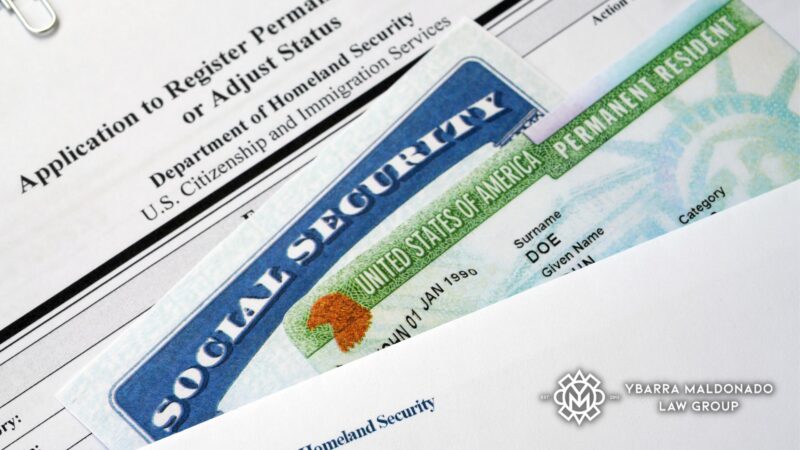What Is the “Public Charge” Rule in U.S. Immigration Law?

A public charge is someone who is dependent on the Federal Government once they receive immigrant status. Since 1882, the public charge rule has been part of immigration law. The United States Congress had the power to deny a visa to anyone they determined would become a “public charge.” It was not until 1999 that public charge gained an official definition from the former Immigration and Naturalization Service, INS. The INS has now become the Department of Homeland Security, DHS, in the 1999 Interim Field Guidance.
In 2019, under the Trump administration, a new public charge rule arose and began in 2020. This updated public charge rule made it more difficult for immigrants to obtain permanent resident status.
What Is Considered Inadmissible Under the Public Charge Rule?
If you’ve received welfare benefits and long-term subsidized healthcare, using one or more of these public benefits for a year or longer would make you ineligible for a green card based on the public charge ground of inadmissibility:
- Section 8 housing assistance
- Supplemental Nutrition Assistance Program, SNAP, or food stamps
- Any federal public housing subsidies or rental assistance programs
- Medicaid for nonemergencies, other than pregnant women and mothers who saw a doctor within 60 days of giving birth, anyone with disabilities, and children under 21
Prior to the rule change, noncitizens were legally able to take advantage of these benefits. The Department of Homeland Security did not penalize family members of green card applicants. If applicants use two or more public benefits per month, the DHS counts that as two months of benefit use.
History of the Public Charge Rule
Beginning in 1882, the U.S. Congress established the public charge rule so that the government could deny a United States visa to anyone they determined would not be able to care for themselves without becoming a public charge. In 1891, Congress updated the law to prevent anyone who was “likely” to become a public charge. However, neither law actually defined what a public charge was.
In 1999, the United States Citizenship and Immigration Services, USCIS, adopted a guiding principle that considers a public charge as someone who is “primarily dependent on the government for subsistence,” as proven by either using public cash assistance for income maintenance or institutionalization for long-term care at the government’s expense. This includes:
- Monetary assistance under the Temporary Assistance for Needy Families (TANF) program
- Supplemental Security Income (SSI)
- Local and state cash assistance programs that provide income maintenance benefits, called “General Assistance” programs
- Medicaid or other programs that support long-term institutionalization, like a nursing home or mental health institution
Under this updated policy, rarely are immigrants denied their green cards on public charge grounds for two reasons. For starters, Congress has already banned most immigrants from using welfare. Secondly, Congress requires any green card applicant to have financial sponsorship. Sponsors usually include United States citizens or family members who can prove sufficient income to prevent any future dependence on government benefits. The income threshold for sponsors is 125% of the Federal Poverty Guidelines, which is currently $21,137 for couples that do not have children.
If you want to learn more about how to sponsor an immigrant, read our related blog.
Public Charge Rule Update 2023
In 2022, the Biden Administration finalized the new public charge rule that replaces the 1999 Field Guidance. The updated public charge rule excuses many immigrants from the public charge test, which evaluates an immigrant to determine whether they will become dependent on the federal government for support. The update also defines what public benefits are in the public charge test, which reaffirms that most public benefits do not diminish the chances of someone receiving a green card or visa. Finally, by enacting this public charge rule update, the Biden Administration made it more difficult for future administrations to change public charge policies in ways that could harm immigrant families.
2019 DHS Public Charge Rule
In 2019, the Department of Homeland Security expanded the public charge definition to make it so that green cards and other applicants would be denied for not being primarily dependent on government expenses for subsistence, which is the current standard. Under the final rule, the DHS added new criteria for denying any green card application:
- Previous use of government benefits: This policy update expanded the definition of off-limits government benefits to include a broader range of common benefits. In the past, the DHS penalized immigrants for using benefits they could legally use. In some cases, immigrants applying for green cards were not even eligible for some benefits. Still, due to the previous rule, many immigrants would unenroll in public benefits out of fear that it would prevent them from getting their green cards.
- Future use of government benefits: The DHS also expanded on factors that immigration officers need to consider when determining whether an immigrant is likely to become a public charge.
- Age: Applicants younger than 18, older than 61, or any age deemed “unable to work.”
- Health: Any medical condition could be scrutinized as it could affect their ability to work.
- Familial size: More children and dependents could increase the chances of becoming a public charge
- Skills: An applicant’s education and skills were evaluated to determine if they would be able to find employment.
- Financial status: Credit history, score, and other financial liabilities were all considered, including health insurance.
- Insufficient finances: Regardless if an applicant had not used benefits at government expense in the past, they were still at risk of being deemed a public charge due to personal financial resources. A new form was required, the Form I-944 Declaration of Self-Sufficiency, to accompany green card applications. Under the new policy, the DHS implemented the same financial requirements for applicants as they have for sponsors. Applicants must meet the minimum requirements of at least 125% of the Federal Poverty Guidelines for couples without children. The DHS also added a higher threshold for families to meet 250% of the poverty guidelines.
How Could the Public Charge Rule Affect You?

Below, we’ll get more details on who the public rule affects and how the new changes could impact your citizenship.
Who Was Affected by the 2019 Public Charge Rule?
- Green card applicants: The public charge rule policy change affected most individuals applying for green cards. Those affected included green cards based on the following:
- Sponsorship by a U.S. employer
- A family relationship to a U.S. citizen or lawful permanent residence
- Temporary visa applicants: The DHS also implemented new public charge standards for various temporary, nonimmigrant visas if the visa holder needed to extend their stay in the U.S. or switch to a different visa category. Those affected included skilled workers with the H-1B visa. These applicants were not required to complete Form I-944 or the future test as mentioned above, but they still had to prove that they did not receive public benefits for over a year within 36 months.
- Exemptions: The public charge rule didn’t apply to visa applicants like asylees, refugees, individuals who experienced domestic violence, or other categories that Congress exempted from the rule.
How Might the Public Charge Rule Affect LPRs Seeking Citizenship?
Changes to the public charge definition could affect lawful permanent residents, LPRs, who have already received their green cards. These changes could allow the DHS to deport a lawful permanent resident.
A permanent resident can only be deported on the grounds of public charge within the first five years of receiving their green card, and only if they became a public charge based on pre-existing circumstances that were present prior to them receiving their green card. For example, if a healthy individual received their green card but was later in an accident where they need government assistance, this would not be a situation where someone would be deported.
Since green card holders are not typically able to receive welfare benefits, very few have been deported under these circumstances.
In 2018, the Department of Justice released a statement that they would be looking into LPRs’ deportation status in relation to public charges, but nothing was ever finalized.
How Might the Public Charge Rule Affect Visa Applicants Abroad?
The public charge rule was issued by the United States Citizenship and Immigration Services, USCIS. This is the section of the DHS that processes temporary visa applications and green cards within the United States.
Individuals that are abroad are required to file their visa applications with their local embassy or consulate. This process, however, is primarily controlled by the United States Department of State. Initially, the USCIS and the U.S. Department of State followed the same narrow definition of public charge. In 2018 though, revisions to the Foreign Affairs Manual by the State Department expanded the scenarios when a consular officer can deny a visa application on the grounds of public charge.
How Might the Public Charge Rule Affect Green Card Applicant Sponsors?
In 2019, the White House issued a memorandum encouraging Cabinet secretaries to take action against any U.S. citizens and permanent residents if their sponsors received public benefits like Medicaid or food stamps.
For over 20 years, United States law has required that sponsors sign an affidavit of support. During their sponsored application process, they will maintain the necessary sponsor’s household income at 125%. If an immigrant-receiving sponsorship obtains certain government benefits, the government has the right to recover the cash equivalency of those benefits from the sponsor. Since it’s very unlikely that anyone with a green card can be approved for public benefits, this scenario is unlikely.
Do I Need an Attorney for My Immigration Case?
The definition of public charge has changed many times throughout the years. Because of this, it would be beneficial to discuss your case with an experienced immigration attorney in Phoenix. Many individuals that have received benefits have canceled those benefits out of fear of immigration case dismissal on the grounds of public charge. The Ybarra Maldonado Law Group has years of experience fighting immigration cases. We are familiar with the updated public charge rules and will make sure nothing will disrupt your immigration status case.
Contact the Phoenix Immigration Lawyers at YMLG Today
The Ybarra Maldonado Law Group has helped many immigrant families during their journey to becoming United States citizens. You likely have questions about your immigration case and if the public charge rule could affect you. Call us today at 602-910-4040 or submit an online form.

